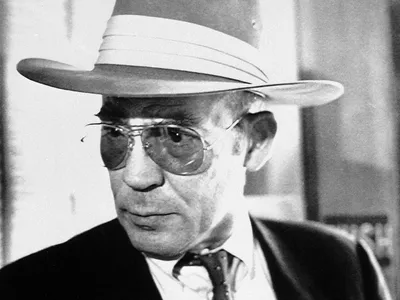kickstand-project.org – Hunter S. Thompson is a name synonymous with a unique style of journalism that blends literary techniques with traditional reporting. As the pioneer of “Gonzo journalism,” Thompson’s work defies conventional boundaries, offering readers a raw, immersive, and often chaotic view of the stories he covered. His distinctive voice and approach have left an indelible mark on the landscape of modern journalism and literature.
Early Life and Career Beginnings
Born on July 18, 1937, in Louisville, Kentucky, Hunter S. Thompson showed an early interest in writing but also a penchant for rebellion and nonconformity. After a tumultuous youth that included run-ins with the law, Thompson embarked on a career in journalism, contributing to various publications while honing his craft.
His early work, including a stint with the National Observer, showcased his ability to combine sharp observations with a compelling narrative style. However, it was his book “Hell’s Angels: The Strange and Terrible Saga of the Outlaw Motorcycle Gangs” that first brought him significant attention. In this work, Thompson embedded himself with the Hells Angels, providing an insider’s perspective that was both riveting and controversial.
The Birth of Gonzo Journalism
The term “Gonzo journalism” was coined to describe Thompson’s style, which emerged prominently in the 1970s. This approach is characterized by a first-person narrative, where the journalist becomes a central figure in the story. Thompson’s writing is marked by its satirical tone, vivid imagery, and a disregard for the traditional objective stance of journalism.
His most famous work, “Fear and Loathing in Las Vegas,” epitomizes Gonzo journalism. The book recounts a drug-fueled trip to Las Vegas, blending fact and fiction in a way that challenges readers to discern reality from imagination. Through this narrative, Thompson explores deeper themes of American culture and the elusive American Dream.
Impact and Legacy
Hunter S. Thompson’s influence on journalism and literature is profound. By injecting subjectivity, emotion, and literary flair into his reporting, he expanded the possibilities of what journalism could be. His work inspired a generation of writers to explore new narrative techniques and pushed the boundaries of storytelling.
Thompson’s legacy is also evident in his fearless approach to covering politics and society. His coverage of the 1972 presidential campaign for Rolling Stone, later compiled in “Fear and Loathing on the Campaign Trail ’72,” remains a seminal work in political journalism. His incisive critiques and unapologetic style provided a candid look at the American political system.
Conclusion
Hunter S. Thompson’s literary journalism continues to captivate readers with its daring style and unflinching honesty. As the father of Gonzo journalism, he reshaped the landscape of reporting and narrative writing. His work remains a testament to the power of storytelling to engage, provoke, and challenge audiences, ensuring his place as a legendary figure in both journalism and literature.

